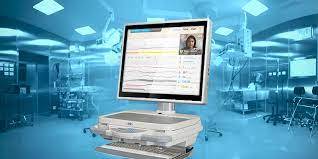Medical Industry
Why Do Hospitals Need Computers With Antimicrobial Housings ?
The healthcare industry faces the challenge of keeping infection rates low. Nearly two million Americans suffer from healthcare-associated infections every year, and nearly ninety thousand of them die. These infections can be caused by a variety of sources, from contact with other human beings to objects. One of the ways antimicrobial tablet medical Computer technology can help hospitals combat the threat of infection is by providing antimicrobial tablet medical computers These devices are designed to eliminate the risk of spreading disease by preventing the proliferation of bacteria, viruses, and other pathogens.
Aside from improving workflow, antimicrobial tablet medical computers also improve patient care. According to the Centers for Disease Control, one in every thirty-one hospital patients has at least one healthcare-associated infection each day. Because computer touch screens and various input devices can become contaminated with microorganisms, these devices are the number one source of bacterial infections in hospitals. These infections are highly contagious and can persist for months on computers. To combat this problem, hospitals should buy antimicrobial tablet medical computers. These devices are made with antimicrobial surfaces so that they will not be a breeding ground for bacteria and viruses.
While these antimicrobial tablet medical computers are designed to reduce the growth of bacteria and viruses, they should still be antibacterial. This is necessary to protect the patients and the hospital from infections. Consumer-grade PCs do not contain antimicrobial resin, but they are still capable of clearing germs. Moreover, because the surface of consumer-grade PCs is highly-touched, they can spread harmful bacteria. Using antimicrobial housing prevents these problems.
The use of computers in hospitals can improve workflow and patient care. Studies by the Centers for Disease Control (CDC) have shown that one in thirty hospital patients is susceptible to a healthcare-associated infection. Infections can be spread by the use of computers with touchscreens and various input devices. The CDC has estimated that gram-positive bacteria can survive up to six months on computer equipment. That is why, antimicrobial tablet medical computers should be built with antimicrobial housings, to keep infections at bay.
Computers are a common source of germs, and hospitals need to protect them. The best antimicrobial tablet medical computer housings can prevent this from happening. By using a computer with antimicrobial housing, healthcare professionals can help prevent these infections from spreading. If it is infected with a pathogen, it could be fatal for the patient. This type of technology is necessary for the hospital to protect itself and the patients.
The best antimicrobial tablet medical computers come with antimicrobial housings. They contain antimicrobial agents that discourage bacteria from growing. Unlike consumer-grade PCs, these computers have antimicrobial resins, which are essential for the protection of hospital patients. Infections on the surface of these PCs are the most common cause of death in the medical field, and the use of these types of PCs increases this risk to a great extent.
In addition to protecting the patients, computers should also be protected from contamination. The Centers for Disease Control report on the number of nosocomial infections in hospitals. These infections are very common and cost the healthcare industry over twenty billion dollars per year. Most of these infections occur on highly-touched surfaces, such as the computer. As such, hospital PCs with antimicrobial housings can protect hospital patients.
Hospitals need computers with antimicrobial housings. These computers are designed to be sterile and are the best for patient safety. Regardless of whether they are used in a hospital or at home, they should have antimicrobial-treated housing to protect them. These types of PCs also have antimicrobial housings to protect the staff and patients. They are better for the environment than consumer-grade computers.
In hospitals, computer housings are made of antimicrobial materials, which discourage the growth of microbes on them. These housings should have an antimicrobial coating to protect hospital patients and staff. The antimicrobial housings should not only be made of plastic but should also have an antimicrobial resin. The medical-grade PCs should be durable and resistant to shock. These PCs should be sterile.
0users like this.


